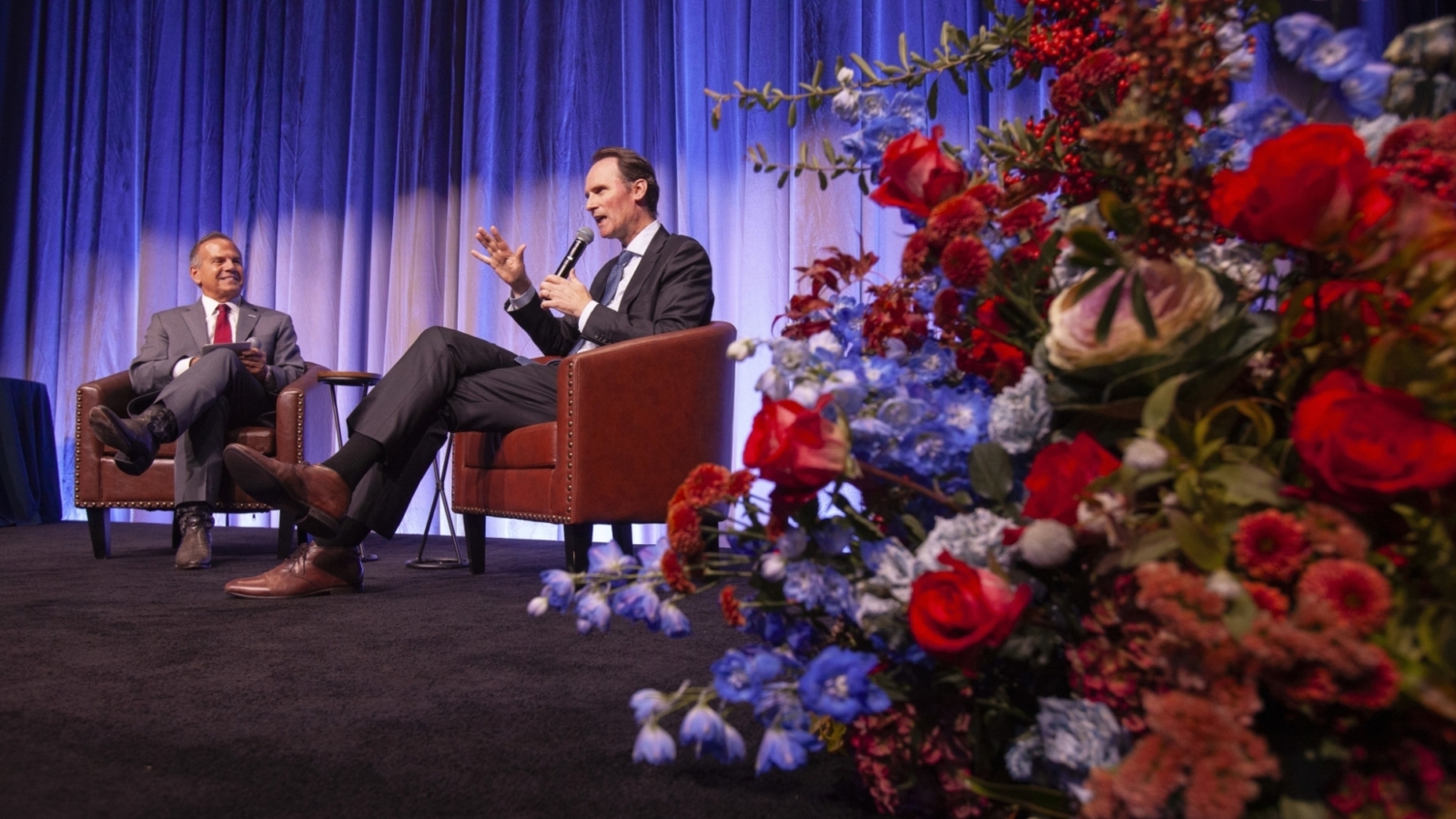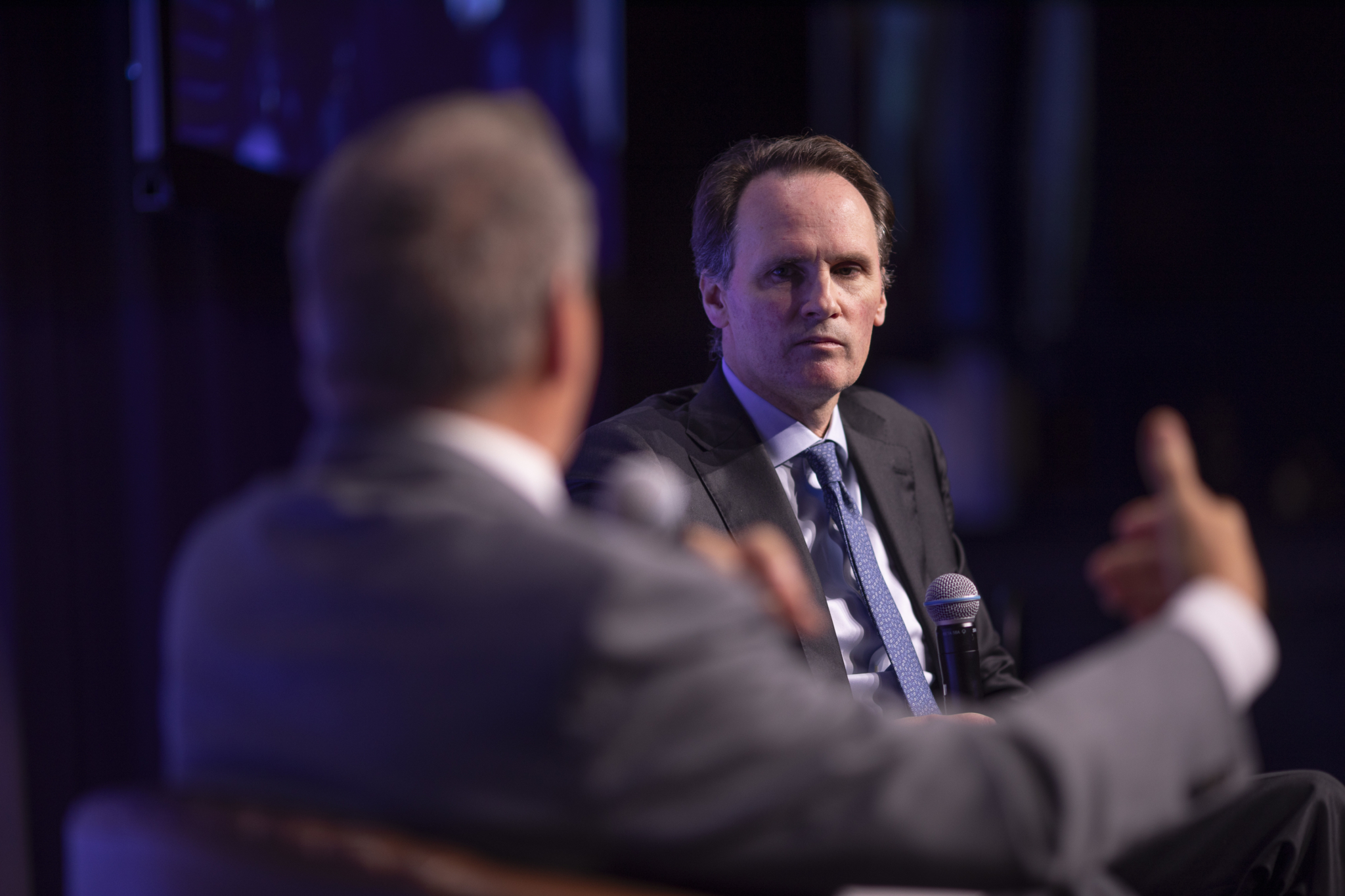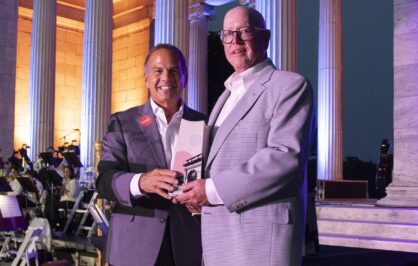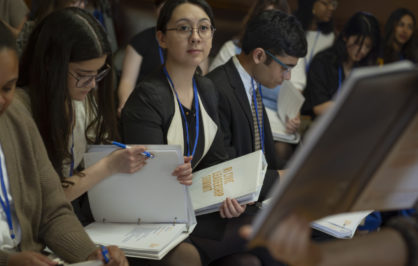
Civic Leadership
Pressing Forward with John Palfrey
A conversation with the President of the John D. and Catherine T. MacArthur Foundation on philanthropy’s role in civic health, sustaining local news, and building a more just, verdant, and peaceful world.
Recently, Rhode Island Foundation President and CEO David Cicilline sat down with John Palfrey, President of the John D. and Catherine T. MacArthur Foundation, a leading charitable organization that invests in solutions to some of society’s most critical issues. In this thoughtful exchange, Palfrey explores how MacArthur advances its mission to build a more just, verdant, and peaceful world by investing in civic health, supporting local communities, and sustaining trustworthy journalism.
Following are highlights from their October 30, 2025, conversation about the future of philanthropy, why initiatives like Press Forward matter, and the "superpowers" that community foundations have to bridge divides and strengthen democracy.
For the full discussion, tune in to Together RI, a podcast dedicated to exploring how philanthropy can help to address pressing challenges in our communities, across the nation, and around the world.
If you could begin by telling us a little bit about the MacArthur Foundation, what it does, how it began, and your leadership there.
The John D. and Catherine T. MacArthur Foundation is a large legacy foundation based in Chicago. We also operate in Nigeria and India. It's probably best known for the MacArthur Fellows, which are called the 'Genius Grants.' It turns out that's about five percent of what we do, and my guess is the Rhode Island Foundation is probably known for something that's like five percent of what you do, while 95% of what you do is less well known. But like you, we are very devoted to place as well. So the [MacArthur] family made its money in Chicago, and we deeply devote ourselves to investing in Chicago and particularly addressing some of the inequities in that city, as well as having a national and international footprint.
You've become such a leader for national foundations, and community foundations as well. I wonder if you could speak a little bit about how you see the landscape of philanthropy nationally, and what you're seeing in terms of the way foundations are responding to this moment.
This is a very strange time in the charitable nonprofit world for various reasons. I know that you were in the Congress, I know you were a mayor, but I'm not talking about politics. The cuts that have occurred and are about to occur are potentially putting 40 million Americans off of their ability to eat, in the next few days. These cuts are creating crises that are very hard for those of us in the charitable and nonprofit world to address. At the same time, for the first time, I believe, in American history, the charitable nonprofit sector is under attack from the federal government. It's very weird. I can't understand exactly why we are in this position, but we are, and this is not a fight we picked...I think one of our great strengths, though, is that we have a combination of community foundations that are so grounded in place and the health of communities, as well as national foundations who are working together really just to make the case for what we're doing and where [it's] necessary to push back on the excessive attacks that we're facing right now.
One of the things that I admire about the MacArthur Foundation is that you seem to really approach so much of the work by focusing on local organizations and local communities. I think there are other national funders that may not have that same focus. Is there a reason that you have focused so much on locally run and operated organizations? I think MacArthur has really distinguished itself in that way. And I'm just wondering if that has always been the strategy, or something you brought when you came to MacArthur?
Well, I'm glad that you describe it that way because that is absolutely the game plan. And I don't know exactly how long we've been at it, but I do believe that there is no better way to solve a problem than to do so locally. And it turns out...that we have community foundations, that we have this spirit of charitability...so distinctive and so effective, and I see it in Chicago where people really come together. We have an amazing community foundation there.
But I would take the example of the local news crisis that you and I both have been working on. So David is the national leader in thinking about civic health and communities. And one of the angles to that, as you may know, is the decline of local news and the need for us, whether it's public media or otherwise, for us in philanthropy to step in and help these once-wonderful businesses. And so across the country we've been thinking about this. There are 30,000 communities in America. No one foundation, no matter how devoted we are to this, could get this done. But if we work together, we actually really can, in my view. And so the approach for the [Press Forward] project that you and I have worked on is to ask 'how do we team up?'
So we now have 41 chapters, of which Rhode Island Foundation is one of the strongest, that are doing this work in communities to figure out what's the model? How are we going to sustain public media? Why do we need to sustain media? Well, we're losing two and a half newspapers a week in America, and as of October 1, the Corporation for Public Broadcasting, which supports NPR and PBS, does not exist. It has been defunded, so there is no public media right now, unless it is happening at the local level and the state level and philanthropically, and thank goodness you're stepping up to do it.

So the Press Forward initiative that you began and, and as you mentioned - we're very proud that we are a Press Forward chapter, along with the van Beuren Charitable Foundation - I'm wondering if you would speak a little more about that. I mean, you're very modest about it, but this is a really extraordinary undertaking in which you committed and raised - I think the history of it is in weeks - half a billion dollars. So would you talk a little bit about that effort...and why in particular you focused on local journalism and trustworthy, reliable sources of news.
So there is almost nothing that's hard about our jobs, by the way. These are the best jobs in the entire world to give away other people's money. So just to be clear, just starting there, I wake up every day and it is my job to help give away someone else's money to make the world more just, verdant, and peaceful. So anyway, that is a very nice thing to be able to do. However, there are a couple things that are challenging. One is, particularly for a foundation like either of ours actually, where when you look around, the need is so much greater than the resource you have, and you have to choose which things to do. So one of the things MacArthur Foundation has committed to as an enduring commitment, something we're going do forever basically has been around journalism and media for various reasons. And much of the time over the last 40 plus years, that's meant supporting NPR, PBS, our local stations, things like the PBS NewsHour documentary film, things that have been underfunded.
And in these jobs you do these strategy reviews. So after about five years in my job, I did a strategy review around our journalism and media work. And you know what? It came back and it said you absolutely have to do this. Like, if you guys stop funding public media, it would be really bad...and you have to have a national program. But the reviewers said, there's also this other thing, which is local news is in a crisis. So national media is, in some cases actually, not in terrible shape...the local papers were once a good business, now they're a terrible business. Local television news [is] starting to struggle. People are getting more news online and so forth. And so we had this challenge, do you take the money away from National Public Radio...or do you do something else? And so what we did was - we did the math.
We said, what would it take to help reinvigorate local news across 30,000 communities in America? And turned out to be a lot of money. Um, very large number, which I won't even say. And so we said, why don't we go to our friends...what if we actually did this together? And the game plan was get as many national funders as we could to put money into a pot, and then we're going to go community by community across America and find the most amazing community foundations and local donors and we are going to make media and journalism something like arts and culture. Something like hospitals, something like an alma mater - where we know we have to support it.
So yes, we raised half a billion dollars relatively quickly. We went from three donors to 22 donors. We now have 110 funders across the country. The most important number though, is 41...there are 41 [Press Forward] local chapters, and the idea is to challenge local communities to step up to support their NPR station, to support their PBS station, to support their local, whatever it is that is providing that community engagement, and noting that what's happening in Rhode Island is probably a little similar to Massachusetts. But what's happening in Alaska may be more similar to what's happening in Wyoming and so forth. And so I think it is a very exciting moment, but it's a very challenging moment, and we need a whole lot more than the half a billion dollars we've raised so far. So we took off the hat of just giving and put on the fundraising hat, and I've been asking people for money in order not to keep it ourselves, but to direct it into the community.
There seems to be a real alignment between the Press Forward work and this larger effort of community foundations to really build a coalition of people that are sharing best practices, sharing ideas, sharing different ways to evaluate the impact of your work, and bringing resources to invest in rebuilding the civic health of our communities...I wonder if you could speak a little bit about how you see the role of community foundations particularly, aligning with and partnering with you and MacArthur around that kind of work.
So we're coming up on 2026, the 250th anniversary of this amazing country, and I think one of the most exciting things happening nationally is the civic health effort that you have launched, grounded in communities and community foundations. It has the brilliance and the spark of something from Providence, Rhode Island, but you've been bringing it around the country. I've been on a whistle stop tour around the country trying to raise money for media, and I see these things fitting very closely together. Civic health, it seems to me, is something that there is a quiet but serious majority around who want kids to have civic education, that want to be able to have a backyard barbecue to argue and then [still] leave as friends. And I just think it is absolutely a way to celebrate this anniversary, this birthday of the country, is to lean into this. So you and I haven't talked about it, but I promise you, we, the MacArthur Foundation, will put money into this effort with you. We will figure out how to make it something that has an enormous celebratory effect and really will support those people who want this kind of a dialogue and this ability, in in our community, to be much healthier than we are right now.
One of the things we heard in the process of listening to lots and lots of Rhode Islanders is can the Rhode Island Foundation do more as our community foundation to help bridge some of these divisions, reduce some of the polarization, reconnect people back to their neighbors and their community? And I've really come to the conclusion that community foundations are uniquely positioned to do that work because they're trusted by their communities. They have the relationships that are necessary. They can bring resources to that work, but it really has to happen at the community level, in partnership with the community.
I often say this about community foundations. I just think you have superpowers. You have superpowers because you pull the room together...your donors, your donor advised fund holders represent the community. We, in national foundations, we have wonderful boards and usually one family and so forth, but it's a very different thing, I think, to raise money and to give money in the way that you do. You have to be responsive to community. You won't be in this job very long if you're not actually reflecting the diversity that your community has in a way that I think is so powerful. And there aren't that many civic entities right now who can do this in the way that you do it.
This conversation has been edited and condensed. Listen to the full interview and follow Together RI on Apple Podcasts and Spotify to stay connected.


